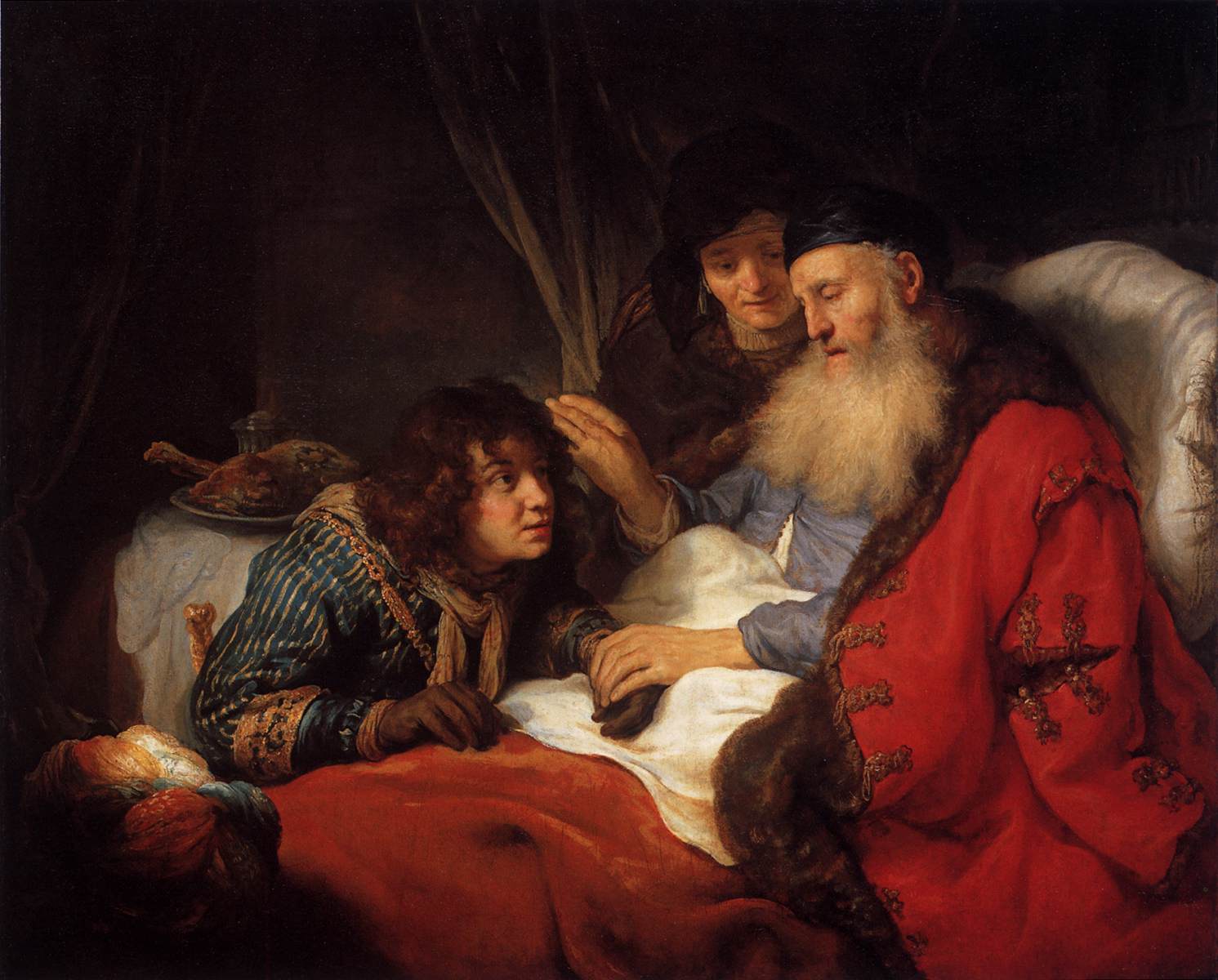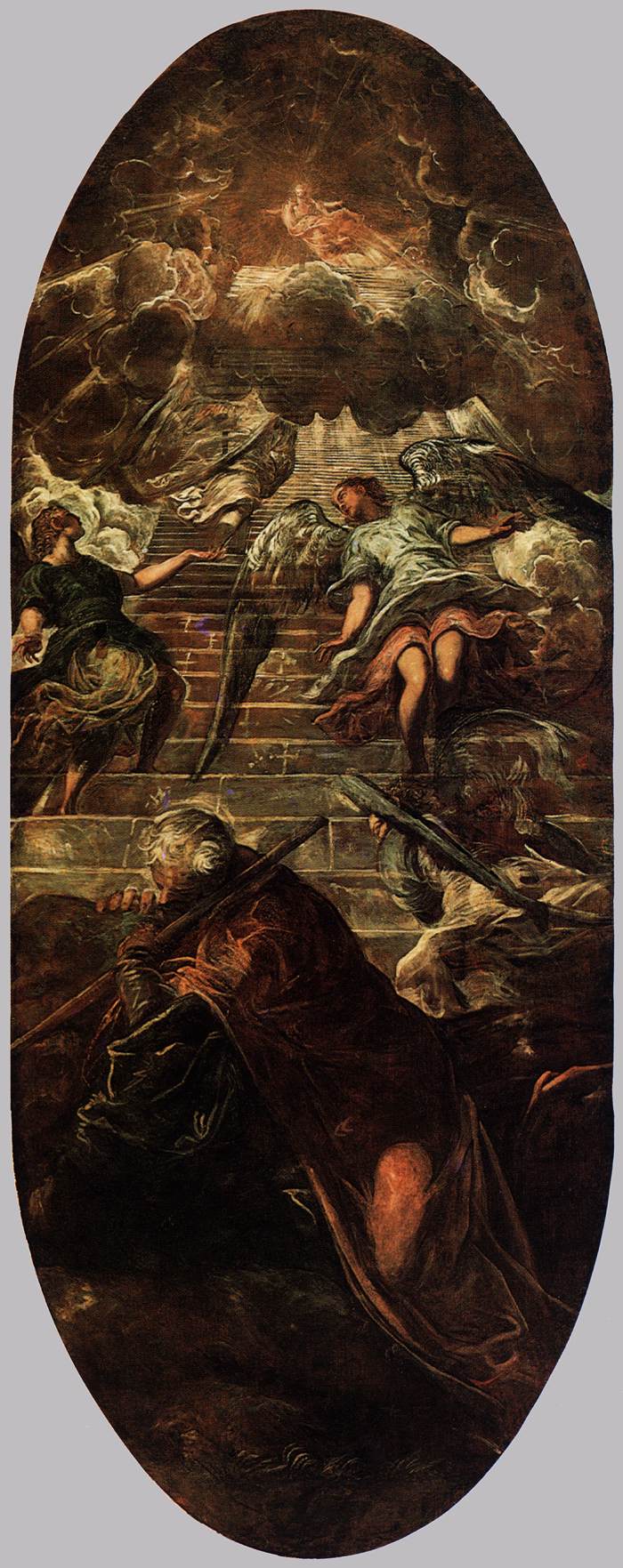There is a famine, but God tells Isaac not to go to Egypt to avoid it. So Isaac lives in Gerar, where like Abraham he tells people that Rebekah is his sister, so they won't kill him and take her. But Abimelech, the king of the Philistines, looks out of of the window one day and sees Isaac "sporting with Rebekah his wife." (No kidding, that's what it says.) So Abimelech calls Isaac in and asks how come he said she was his sister when she's obviously his wife? Isaac explains that he was afraid he'd get killed because she's so beautiful, but Abimelech worries that one of his people might have slept with Rebekah under the impression that she was available, and thereby "brought guiltiness upon us." So he puts out the word that nobody is to touch Isaac or Rebekah under pain of death.
Isaac gets rich, and the envious Philistines start filling up the wells Abraham had dug, so Abimelech tells him to move on, "for thou art much mightier than we." Isaac pitches his tent in the valley of Gerar and digs out the wells that had been filled up, but the herdsmen of Gerar fight with Isaac's herdsmen over the water, so Isaac moves on to Beer-sheba, where Abimelech makes a covenant with him, promising to leave him alone.
When Esau is forty, he marries two Hittite women, Judith and Bashemath, but Isaac and Rebekah are unhappy about it.
Chapter 27
Isaac grows old and blind, and before he dies he asks Esau, his favorite son, to hunt some venison and make his favorite dish out of it. Then, he says, he will give him his blessing. But Rebekah, who favors Jacob, overhears this, and tells Jacob to kill two goats and she will make Isaac's favorite dish from them before Esau returns with the venison. "And thou shalt bring it to thy father, that he may eat, and that he may bless thee before his death."
Jacob points out that Esau is hairy, whereas he is smooth, so that if Isaac touches him, he'll realize that he's being tricked. "I shall bring a curse upon me, and not a blessing." Not to worry, Rebekah says. "Upon me be thy curse, my son: only obey my voice, and go fetch me them." So Jacob does as he's told, and Rebekah prepares the meat. She also takes some of Esau's clothes and puts them on Jacob, and covers his hands and the back of his neck with the goatskins.
 |
| Govert Flinck, Isaac Blessing Jacob, 1638 |
After he eats, Isaac asks Jacob to come closer so he can kiss him, and he smells the clothes Rebekah has taken from Esau. Isaac says, "See, the smell of my son is as the smell of a field which the LORD hath blessed."
Therefore God give thee of the dew of heaven, and the fatness of the earth, and plenty of corn and wine;Then Esau comes back from his hunting trip, prepares the meat, and brings it to Isaac, who is confused and astonished; he "trembled very exceedingly." Isaac tells Esau what has happened: "Thy brother came with subtilty, and hath taken away thy blessing." (That word "subtilty" is interesting: The only other "subtil" creature we have heard of is the serpent who tempted Eve.)
Let people serve thee, and nations bow down to thee: be lord over thy brethren, and let thy mother's sons bow down to thee: cursed be every one that curseth thee, and blessed be he that blesseth thee.
Esau is naturally furious: He sold his birthright to Jacob for some lentils, and now his brother has stolen Isaac's blessing. Isaac admits, "I have made him thy lord, and all his brethren have I given to him for servants; and with corn and wine have I sustained him: and what shall I do now unto thee, my son?" Esau asks if there's any blessing left over, but there isn't much.
Behold, thy dwelling shall be the fatness of the earth, and of the dew of heaven from above;Esau vows to kill Jacob as soon as the period of mourning after their father's death is over, so Rebekah tells Jacob to flee to her brother Laban's. Besides, she's still pissed off because of the Hittite women Esau married, and doesn't want Jacob to marry one of them too.
And by thy sword shalt thou live, and shalt serve thy brother; and it shall come to pass when thou shalt have the dominion, that thou shalt break his yoke from off thy neck.
Chapter 28
Isaac, too, doesn't want Jacob marrying any of the local girls, so he sends him off to marry one of his cousins: "the daughters of Laban thy mother's brother." Esau, still smarting from Jacob's dirty trick, admits that his marriages haven't exactly made his family happy, so he marries his aunt: "Mahalath the daughter of Ishmael Abraham's son."
When Jacob stops for the night on his way to Laban's, he takes some stones for a pillow and has a dream of "a ladder set up on the earth, and the top of it reached to heaven; and behold the angels of God ascending and descending on it."
 |
| Jacopo Tintoretto, Jacob's Ladder, 1577-78 |
Chapter 29
When Jacob gets near Haran, he finds some sheep waiting to be watered at a well with a great stone over its mouth. While he is talking with the shepherds, Laban's daughter Rachel arrives with her father's sheep, so Jacob rolls away the stone so they can be watered. Then he kisses Rachel and tells her that he is Rebekah's son, so she runs to fetch her father, Laban, who comes out and welcomes Jacob.
Laban has two daughters: Rachel is the younger, and Leah the elder. "Leah was tender eyed; but Rachel was beautiful and well favoured." So Jacob strikes a deal with Laban: He will serve Laban for seven years and marry Rachel. Jacob is so in love with Rachel that the seven years go by like just a few days.
When the time is up, Jacob asks to be married to Rachel, and Laban holds a feast. But after it he brings Leah to Jacob's tent in the dark. When Jacob discovers in the morning that he has slept with Leah instead, he asks what Laban has done to him. Laban explains that it's not the custom of their country to marry the younger daughter first. But if Jacob will stay with Leah for a week, then he'll give him Rachel as well -- as long as he serves Laban another seven years. So Jacob gives in and agrees.
God doesn't like it that Jacob despises Leah, so he sees to it that Leah gives birth while Rachel remains barren. Leah's first child with Jacob is Reuben, then she has another named Simeon, followed by Levi and Judah.
Chapter 30
Rachel is angry that Jacob keeps getting Leah pregnant but not her, but Jacob blames it on the Lord. So she gives Jacob her handmaid, Bilhah, hoping that she'll conceive and Rachel will have a child to raise. Bilhah gets pregnant and Rachel names the child Dan. Then Bilhah has another that Rachel calls Naphtali. Now Leah wants more children, so she gives Jacob her handmaid Zilpah, who produces a son Leah names Gad. Then Zilpah has another one that Leah calls Asher.
Leah's son Reuben finds some mandrakes and takes them to his mother. When Rachel sees them, she asks for them, and agrees to let Leah have sex with Jacob in exchange for the mandrakes. Leah conceives, and names this son Issachar. Then she has another son with Jacob that she names Zebulun, followed by a daughter, whom she calls Dinah.
Finally, God decides to let Rachel have a child, and she names him Joseph. Then Jacob decides it's time to move all of this family back to where he came from. Laban wants them to stay, but asks what Jacob wants in the way of wages. Jacob points out that he has greatly increased Laban's herd of cattle since he has been there, so he proposes to go through the heard and keep "all the speckled and spotted cattle, and all the brown cattle among the sheep, and the spotted and speckled among the goats."
But then Jacob pulls another one of his tricks, like the one he used to steal Esau's blessing. He takes "rods of green poplar, and of the hazel and chestnut tree," and peels the bark off of them in stripes. Then he puts the rods at the watering troughs where the flocks drink. "And the flocks conceived before the rods, and brought forth cattle ringstraked, speckled, and spotted. He also shows the rods to the stronger cattle, but not to the weaker ones, so that "the feebler were Laban's, and the stronger Jacob's."
Chapter 31
Laban's sons are mightily ticked off that Jacob is getting away with so much of their father's cattle, and Jacob can tell that Laban shares their anger. The Lord suggests that Jacob should get started on his move, and promises to be with him along the way. So Jacob tells Rachel and Leah to hurry and get ready. Their father, he tells him, has changed his mind about Jacob's wages ten times, but the Lord has seen to it that Jacob prospered from it. God, he says, is the one who made the cattle speckled and spotted: "Thus God hath taken away the cattle of your father, and given them to me." He claims that God appeared to him in a dream and told him that he did this because he saw how Laban mistreated Jacob. "I am the God of Beth-el, where thou anointedst the pillar, and where thou vowedst a vow unto me: now arise, get thee out from this land, and return unto the land of thy kindred."
When they have left, Laban discovers that Rachel has taken his "images" -- his idols. So Laban pursues Jacob and catches up with him at Mount Gilead. He claims that Jacob stole away "secretly," without letting Laban give him a proper send-off, "with mirth, and with songs, with tabret, and with harp," and without letting him kiss his daughters and his grandsons goodbye. He says that Jacob's God spoke to him and told him not to do Jacob harm, but he wants to know why Jacob has stolen his gods.
Jacob replies that he was afraid Laban might try to take his daughters away from him, but he doesn't know anything about the idols. So Laban searches Jacob's and Leah's tents and doesn't find the idols. Then he goes to Rachel's tent, but "Rachel had taken the images, and put them in the camel's furniture, and sat upon them. And Laban searched all the tent, but found them not."
 |
| Giovanni Battista Tiepolo, Rachel Hides the Idols from Laban, 1726-28 |
So Laban agrees to a covenant with Jacob, and agrees that they won't bother each other anymore, as long as Jacob doesn't abuse his daughters or take other wives. The next morning, Laban kisses his daughters goodbye and goes home.
 |
| Pietro da Cortona, The Reconciliation of Jacob and Laban, 1630-35 |
No comments:
Post a Comment